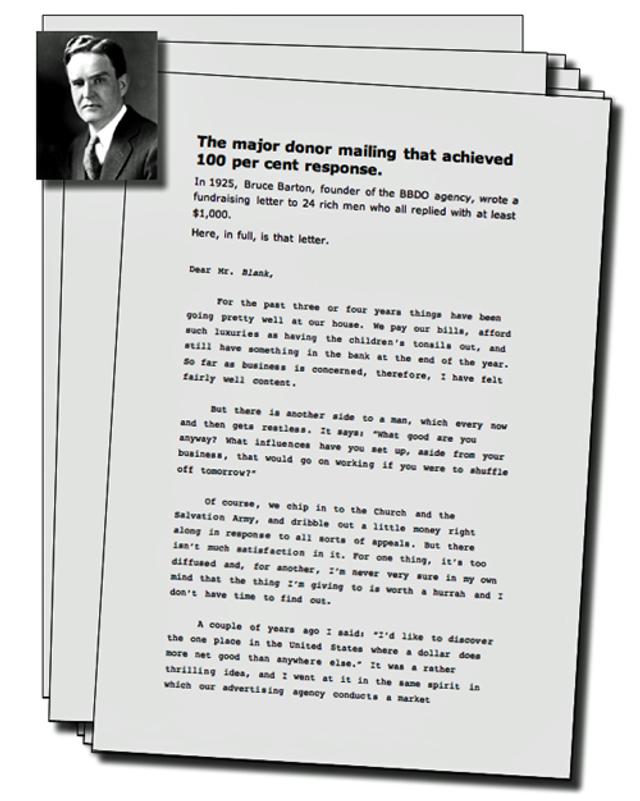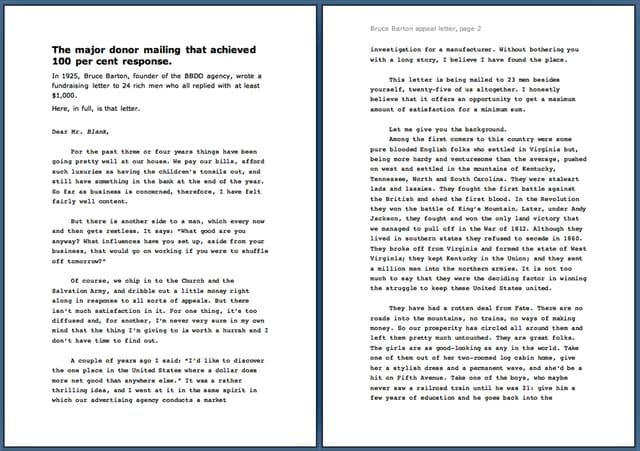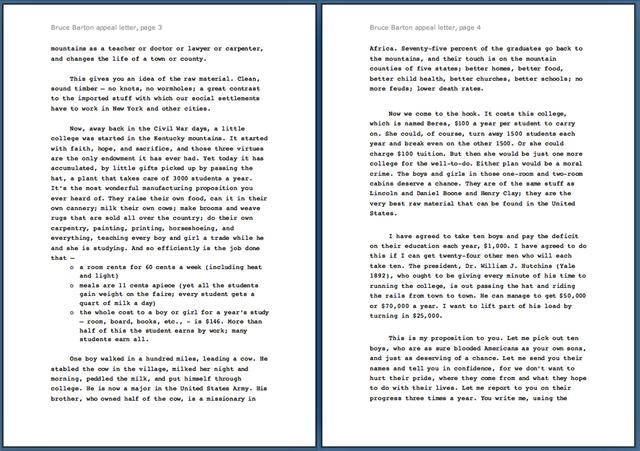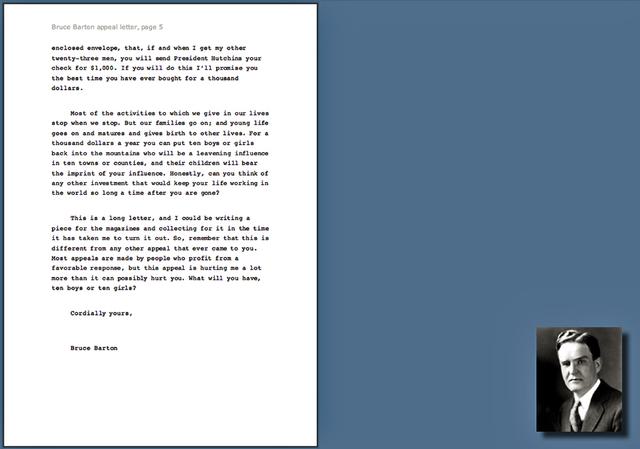Deerfield Academy: the Bruce Barton classic long copy letter from 1925 that pulled a 100 per cent response
- Exhibited by
- Carolina Herrera, project manager, SOFII.
- Added
- June 01, 2011
- Medium of Communication
- Direct mail.
- Target Audience
- Major gift.
- Type of Charity
- Education.
- Country of Origin
- USA.
- Date of first appearance
- 1925.
SOFII’s view
SOFII is indebted to writer Fergal Byrne for pointing us towards this fundraising treasure. Though not many people will remember Bruce Barton (1886-1967) he is credited as one of the great Americans of the twentieth century. Significantly for us he was also a master communicator and an intuitive fundraiser. The appeal letter here is a masterpiece for its time, as its results show. See also on SOFII The Deerfield letters, a collection of fundraising classics from 1944 to 1960 for Deerfield Academy, Massachusetts, also written by Bruce Barton and of which this brilliant piece of communication was a forerunner. See below for links to this fascinating archive now on SOFII.
Creator / originator
Bruce Barton himself.
Summary / objectives
To raise $1,000 from each of just 24 individuals, through a personal letter.
‘When you're through changing, you're through.’—Bruce Barton
Background
Born in Tennessee in 1886, Bruce Barton graduated from Amherst College in 1907. He worked as a publicist and magazine editor before co-founding the Barton, Durstine & Osborn (BDO) advertising agency in 1919. Nine years later the agency merged with the George Batten agency to become Batten, Barton, Durstine & Osborn (BBDO). Barton headed the agency until 1961, building it into one of the industry's leaders. Among other famous campaigns, he created the character of ‘Betty Crocker’. He is also credited with naming General Motors and General Electric. Politically conservative, he offered his public relations expertise to many Republican candidates over the years. A staunch opponent of Roosevelt and the New Deal, he served two terms in the United States House of Representatives (1937-1941), and in 1940 ran unsuccessfully for US Senator for New York.
Barton was most famous, however, as the author of many bestselling guides to personal success. He also wrote hundreds of articles for popular magazines, offering readers advice and inspiration to pursue the American dream. His most famous book, The Man Nobody Knows (1925), depicted Jesus Christ as a successful salesman, publicist and role model for the modern businessman. One historian writes: ‘Barton believed incurably in material progress, in self-improvement, in individualism, and in the Judeo-Christian ethic, and none of the profound crises through which his generation lived appreciably changed the tenor of his writings or their capacity to reflect what masses of Americans, optimists in the progressive tradition, apparently continued to want to hear.’
Bruce Barton was a descendant of the Rev. John Davenport, the founder of Yale University and of New Haven, Connecticut, through his mother.
Special characteristics
Long copy, but it worked. Note the hook and calls to action.
Influence / impact
None that we know of though we presume both to be considerable. Study carefully before you write your next appeal, then please let us know how it went.
Costs
Small, and it seems Barton covered these himself.
Results
100 per cent response in its only outing, as far as we know.
Merits
A classic from history and might be worth studying if you aspire to similar results.
Other relevant information
The sayings of Bruce Barton:
- Action and reaction, ebb and flow, trial and error, change - this is the rhythm of living. Out of our over-confidence, fear; out of our fear, clearer vision, fresh hope. And out of hope, progress.
- Before you give up hope, turn back and read the attacks that were made on Lincoln.
- Cereal eating is almost a marker for a healthy lifestyle. It sets you up for the day, so you don’t overeat.
- Christ would be a national advertiser today, I am sure, as He was a great advertiser in His own day. He thought of His life as business.
- Conceit is God’s gift to little men.
- If you can give your child only one gift, let it be enthusiasm.
- If you have anything really valuable to contribute to the world it will come through the expression of your own personality, that single spark of divinity that sets you off and makes you different from every other living creature.
- In good times, people want to advertise; in bad times, they have to.
- It takes a real storm in the average person’s life to make him realise how much worrying he has done over the squalls.
- It would do the world good if every man would compel himself occasionally to be absolutely alone. Most of the world’s progress has come out of such loneliness.
The benefit of the doubt: With all these quotes from the great man, we presume that had Mr Barton been writing nowadays, he would have included women in these comments too, and not just through political correctness. For the record the capitalisation in quote 4 is his, not ours.
Bruce Barton: the advertising copywriter:
Bruce Barton packed a lot into one lifetime. He was
- Chairman and co-founder of one of the world’s largest advertising agencies, BBDO.
- Publicist, magazine editor and fiction writer
- United States Congressman and a prominent rival of FDR and the New Deal. (FDR singled out Barton and two other Republican foes in the fantasy firm of Martin, Barton & Fish.)
- A source of countless cling-to-the-memory quotes and catchy phrases (like,‘If advertising has flaws, so has marriage!’)
- And…one heck of a copywriter.
While extolling the lessons we can learn from Bruce Barton’s classic copywriting it should be pointed out that this fine letter is flawed in some ways too. Though Barton was, we understand, a lifelong moderate Republican, viewed by today’s standards at least, some of his references might be considered racist or sexist. Attitudes obviously were different back then, though we’re not sure that this allowance excuses the comment in page 3, paragraph 2 of the letter, which even then many might have found offensive.
It seems not to have depressed response all the same, so who can say? We are sure SOFII’s readers will use their judgement as they borrow from it or adapt it to their own purposes.
The text of Bruce Barton’s letter, in full.
Sent to just 24 individuals, this letter achieved a response rate of 100 per cent. Note how he paints pictures with his words. And particularly the offer and the call to action in the final sentence. Irresistible!
See Philanthropy UK magazine’s take on this classic, here.
While extolling the lessons we can learn from this classic it should be pointed out that this fine letter is flawed in some ways too. Viewed by today’s standards at least, some of its references might be considered racist and sexist. Attitudes obviously were different back then, though we’re not sure that this allowance excuses the comment in page 3, paragraph 2, which even then many might have found offensive. But it seems not to have depressed response.
If you have difficulty reading this letter you can download it here as a PDF.
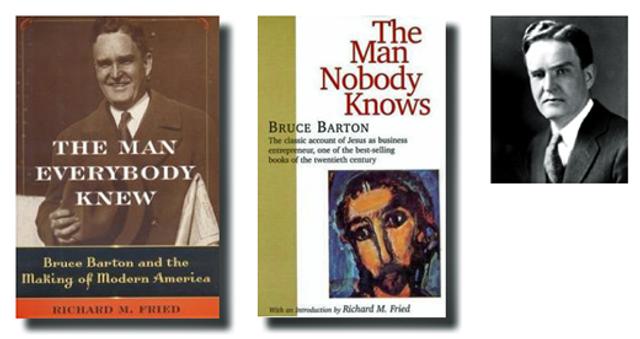
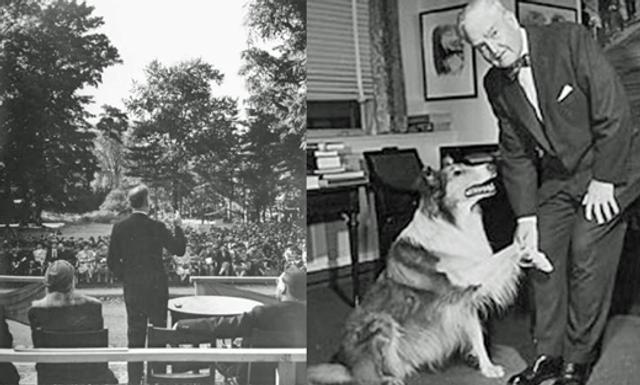
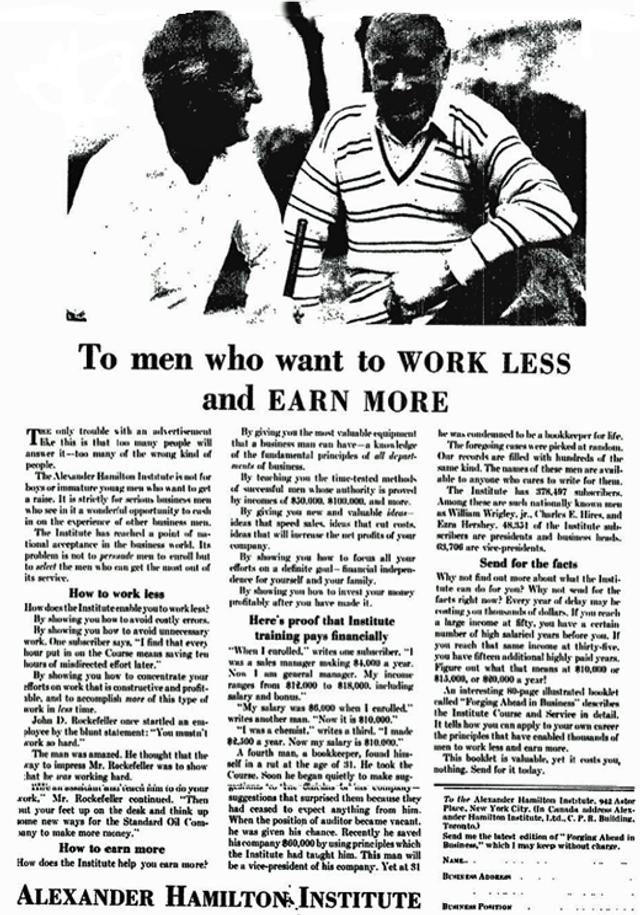 View original image
View original image



